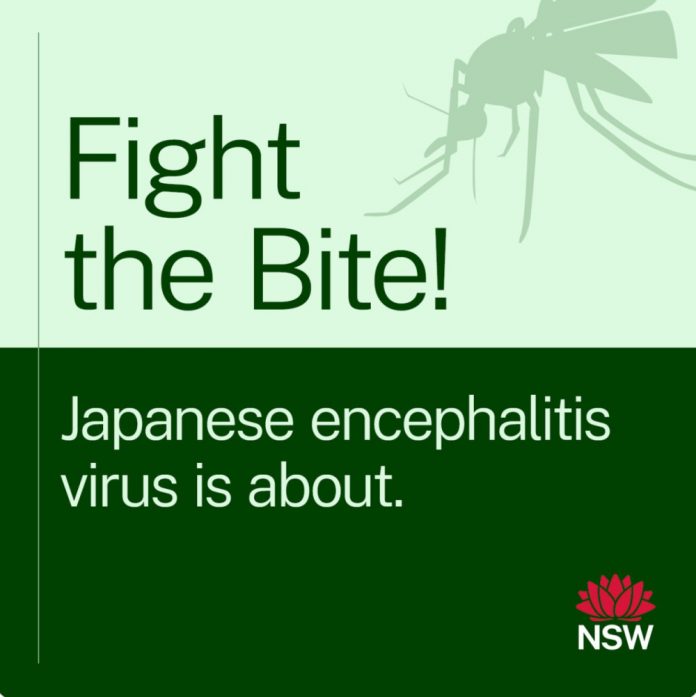You may have recently read about Japanese encephalitis virus (JEV).
NSW Health is urging the public to be vigilant and take precautions against mosquito bites as NSW has recorded its first death of a person with Japanese encephalitis.
NSW Health has advised a man from the Griffith region who was aged in his 70s died in a Sydney hospital on February 13 2022. Post-mortem testing subsequently found he had contracted the JE virus, which was confirmed today (Wednesday 9 March 2022).
There are now four known cases of JE in NSW residents, including two cases announced previously, a man and child, who are currently being cared for in Victorian hospitals.
The fourth case is a woman aged in her 60s who spent time in the Griffith region before the onset of her illness. She was treated in hospital before being discharged recently and she is continuing to recover at home. This is the second confirmed case who has spent time in the Griffith region.
Several more people in NSW are undergoing further testing for JE, and more cases are expected to be confirmed over the coming days and weeks.
Locally acquired cases of JE have never previously been identified in NSW in animals or humans. Since late February 2022, the JE virus has been confirmed in samples from pig farms in NSW, Queensland, Victoria and South Australia.
What is Japanese Encephalitis?
JEV is a viral illness spread by mosquitoes. It can infect animals and humans and is confirmed in samples from several pig farms in regional NSW.
The virus cannot be transmitted between humans, and it cannot be caught by eating pork or pig products. Locally acquired cases of JEV have never previously been identified in NSW in animals or humans.
Mosquito control activities are being carried out in the vicinity of farms where pigs are confirmed to have been infected by JEV. NSW Health is arranging vaccination of workers on affected farms.
There is no specific treatment for JEV, which can cause severe neurological illness with headache, convulsions and reduced consciousness in some cases.
Dr Marianne Gale, NSW Health Acting Chief Health Officer, said the best thing people throughout the state can do to protect themselves and their families against JEV is to take steps to avoid mosquito bites.
“We are working closely with the NSW Department of Primary Industries and other states and territories to determine the extent to which the virus is circulating,” Dr Gale said.
‘Unfortunately, our recent wet weather has led to very high mosquito numbers, so we need the community to be particularly vigilant and take steps to avoid mosquito bites.
“We know mosquitoes are most active between dusk and dawn, and we need people planning activities near waterways or where mosquitoes are present to be especially cautious, particularly those in the vicinity of the Murray River and its branches.”
How To Avoid Mosquito Bites
Simple actions to avoid mosquito bites include:
-
- Avoid going outdoors during peak mosquito times, especially at dawn and dusk.
- Wear long sleeves and pants outdoors (reduce skin exposure). Also wear shoes and socks where possible. There are insecticides (e.g. permethrin) available for treating clothing for those spending extended periods outdoors.
- Apply repellent to all areas of exposed skin, especially those that contain DEET, picaridin, or oil of lemon eucalyptus, which are the most effective against mosquitoes. The strength of a repellent determines the duration of protection, with the higher concentrations providing longer periods of protection. Always check the label for reapplication times.
- Reapply repellent after swimming. The duration of protection from repellent is also reduced with perspiration, such as during strenuous activity or hot weather, so it may need to be reapplied more frequently.
- Apply the sunscreen first, and then apply the repellent. Be aware that DEET-containing repellents may decrease sunscreens’ sun protection factor (SPF), so you may need to re-apply the sunscreen more frequently.
- For children in particular – most skin repellents are safe for use on children aged three months and older when used according to directions. Although some formulations are only recommended for children aged 12 months and older – always check the product. Infants aged less than three months can be protected from mosquitoes by using an infant carrier draped with mosquito netting secured along the edges.
- Be aware of the peak risk times for mosquito bites. Avoid the outdoors or take preventive actions (such as appropriate clothing and skin repellent) between dawn and dusk when most mosquitoes become active, especially close to wetland and bushland areas.
- If camping, ensure the tent has fly screens to prevent mosquitoes from entering.
- Mosquito coils and other devices that release insecticides can reduce mosquito bites but should be used in combination with topical insect repellents.
- Reduce all water-holding containers around the home where mosquitoes could breed. Mosquitoes only need a small amount of liquid to breed.
Are There More Mozzies Around Due to Wet Weather?
The New South Wales Arbovirus Surveillance and Mosquito Monitoring Program publish a weekly report during the arbovirus season (usually November to April) on mosquito abundance at trapping sites and weather and tidal information relevant to mosquito abundance.
You can read the weekly report here. The last report was for the week ending 28 February 2022
The number of mosquitoes trapped at trapping stations around Sydney is set out below.
Dr Cameron Webb is one of Australia’s foremost experts on mosquitoes (ITC follows him on Twitter, and each weekend, he is out trapping mozzies).
His advice is as follows:
“Mosquitoes are expected to increase in many parts of NSW over coming weeks. We’re entering the peak mosquito-borne disease risk period, so to protect yourself and your family from Japanese encephalitis virus (and Ross River virus), take steps to avoid mosquito bites #NSWFloods 🦟”
Dr Webb told ITC last Friday (4 March 2022) the following:
“There is no evidence JEV is active along the coast; it is mostly limited to western NSW. You’re right that it’s mostly focused around piggeries, but that doesn’t mean it isn’t more widespread but just no evidence of it in Sydney. Let’s hope it stays that way!”
There is no need to panic if you take the usual protection against mosquito bites. Protecting yourself and your family against mosquitoes bites should be standard practice. Mosquitoes carry several diseases, including Ross River virus and Barmah Forest virus. If you are heading away at Easter or the school holidays and camping near water, you should ensure that you take extra protection against Mosquitoes.
View further information on mosquito-borne disease and ways to protect yourself.
Fact sheets on specific mosquito-borne diseases, including Japanese encephalitis Ross River virus and Barmah Forest virus, are available on the vector-borne disease fact sheets webpage.















